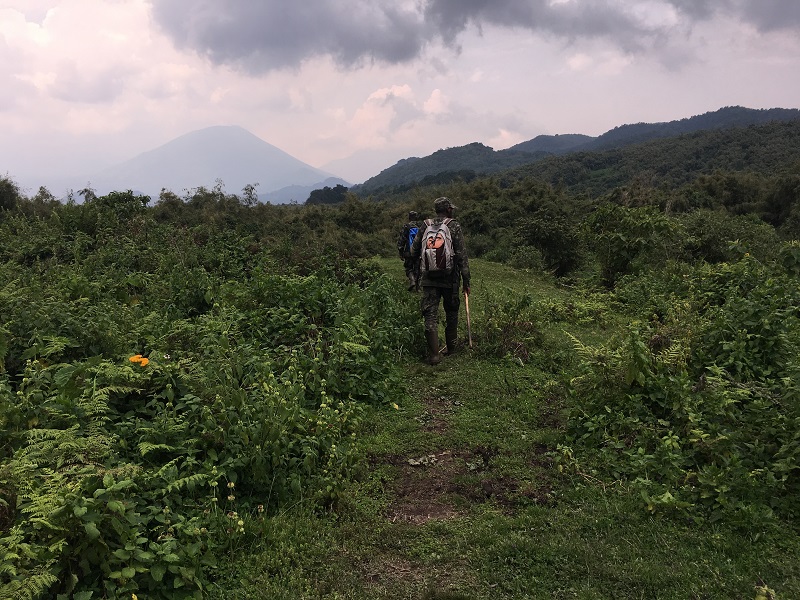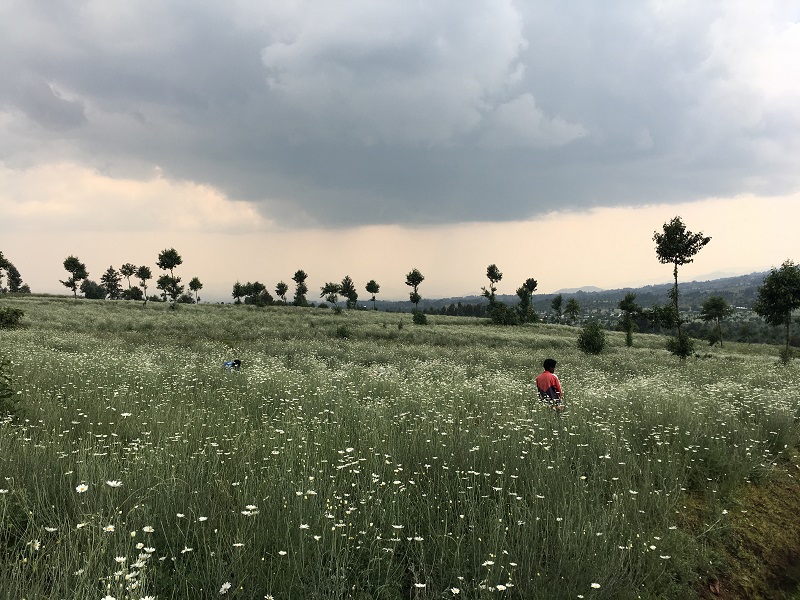
In Rwanda's Volcanoes National Park, a young gorilla hangs on a vine. Photo for The Washington Post by Mary Winston Nicklin
Kigali is the cleanest capital I've seen. No trash littering the streets - not one plastic bag blighting the landscape. (They were banned in 2008.) From our perch on the deck at Repub Lounge, we can take in views of the lush hills shrouded in bougainvillea.
The restaurant is packed. We pop tiny fried fish in our mouths, washed down with urgwagwa, the local banana beer. Laughter fills the room. The live band's upbeat jazz drifts into the night, mingling with the birdsong.
I had come to Rwanda with my college roommate to celebrate a big birthday on a trip years in the making. We had dreamed about venturing to Volcanoes National Park to see the endangered mountain gorillas munching on wild celery stalks and bamboo shoots in their high-altitude realm. Swept up in Rwandan music and coffee-fueled optimism, we find that the country has much more to offer than the famous gorilla treks.
In vibrant Kigali, we can't get enough of the local coffee, cultivated in the volcanic-rich soil around Lake Kivu.
Rwanda is developing a reputation as "the Switzerland of Africa," not just because of its rolling and landlocked geography but also its safeness and economic growth. The government has encouraged entrepreneurs by facilitating business registration. (It takes just six hours.) And the "Made in Rwanda" strategy, launched in 2016, has reduced the trade deficit while increasing exports. Along these lines, we're smitten with the handicrafts and find lovely boutiques like Abraham Konga Collections, brimming with the colorful baskets found in trendy American stores. Gahaya Links, a handicraft company dedicated to women's economic empowerment, has a beautiful showroom and its goods are also found at Macy's. (Much of the population still lives in extreme poverty, and companies such as Gahaya Links have a profound social impact.)
These scenes are a far cry from the Rwanda of April 1994. Twenty-five years ago, this small, Massachusetts-size country experienced a horrific genocide that left more than 800,000 people slaughtered largely by machete, their corpses left to rot in the mud and float in rivers. This atrocity took place over 100 days. Half a century after the Holocaust, the unspeakable had happened again. The United Nations - and the United States - failed to intervene in the attack. President Bill Clinton has called that inaction one of the deepest regrets of his tenure.
A stop at the Kigali Genocide Memorial is a necessary, sobering reminder. The museum explains the genesis: Colonial "race science" imposed "class" differences between the Tutsi and Hutu people, dividing a nation that had existed peacefully, spoken the same language and practiced the same religion for generations. Outside, the remains of 250,000 victims are buried beneath a rose-filled terrace.
In his book "We Wish To Inform You That Tomorrow We Will be Killed With Our Families," the New Yorker's Philip Gourevitch describes not just the barbarity of the genocide's political machine, but also the sheer scale of devastation in the aftermath. The country was annihilated. No schools, no water, no electricity, let alone formal courts to try the guilty. Rwanda's comeback - demonstrative of an African-led solution to "reconciliation" and reconstruction - is nothing short of miraculous.
Rwanda now is one of the most talked-about tourist destinations in Africa.
Manzi Kayihura, managing director of the travel company Thousand Hills Africa, says Rwanda has sought a sustainable tourism strategy by limiting mass-market tourism and focusing on projects that will generate more revenue. Public and private investment is paying off: Rwanda is now also one of the top conference destinations in Africa. The gorilla trek has become a bucket list item for travelers - particularly Americans.
We also see Rwanda's rebirth in game-rich Akagera National Park in the east, touching the Tanzania border. This vast expanse of savanna and wetlands was almost lost in the 1990s when it was crowded with fleeing refugees and grazing cattle. Today, this unique ecosystem is managed by African Parks, a nongovernmental organization presided over by Harry, Prince of Wales. Tourism is on the rise, particularly among Rwandans themselves. The park's revenue directly benefits the neighboring communities.
Our park guide Justice, who hails from a nearby village, tells us how he used to stalk birds with a slingshot as a boy. Now he's a keen birder, showing us species like shoebills, African fish eagles and the iconic gray crowned crane. We're so intrigued by the rambunctious antics of a baboon troop that we fail to notice the ominous clouds; the sky opens with a torrential downpour and we high-tail it to camp.
Akagera can be accessed on a day trip from Kigali, but we choose to overnight at Ruzizi Tented Lodge, a solar-powered camp at the edge of Lake Ihema. (The lake is named "tent" in Kinyarwanda after famous British explorer Henry Morton Stanley set up camp on the western shore in 1876.) In this wild primordial domain of hippos and crocodiles, the sounds of the jungle are symphonic. Meals are served next to a fire pit on a deck raised above the water. Cup of coffee in hand, we greet the morning orchestra of grunting hippos and calling kingfishers.
We cross the park in a magnificent day-long game drive. It's hours before we encounter another vehicle. We spy vervet monkeys hanging from trees. Elsewhere, we see zebras, giraffes and herds of elephants. (The lions and rhinos remain elusive.) Crocodiles cruise through the papyrus-edged lakes while hippos bask in the shallows with birds on their backs.

Guides lead gorilla treks in Volcanoes National Park in Rwanda where the lush rainforest cloaks the ancient peaks of the Virungas. Photo for The Washington Post by Mary Winston
"Gorilla permits are the country's gold," Bosco Kayitana, our guide for our week-long stay in Rwanda, tells us on the drive to Volcanoes National Park. The price, which doubled to about $1,500 per person in May 2017, is a means of generating government revenue, with 10 percent going back to local communities in the form of schools and infrastructure projects. Permits are limited to 96 a day. This cash influx aids gorilla conservation by financing the national park's expansion; the park will grow by 25 percent within the next five years.
On the two-hour car ride we listen to songs by Gael Faye, the French Rwandan musician whose poetic novel, "Small Country," was awarded the Prix Goncourt des Lycéens 2016 in France. (The best-selling debut novel, which is being adapted for a screenplay, tells the genocide story through the eyes of a 10-year-old narrator, heightening its senseless horror.)
As we head north, Rwanda's pristine landscape morphs into an undulating canvas of forest, farms and fields of pyrethrum flowers, a cash crop sold as a natural insecticide. The Virungas are a chain of ancient volcanoes stretching across the borders of Rwanda, Congo and Uganda. Rising to nearly 15,000 feet, these misty mountains are draped in bamboo belts and rain forest - the world's only habitat for the estimated 1,000 mountain gorillas left.

Next to Volcanoes National Park, villagers cultivate fields of pyrethrum flowers, a cash crop sold as a natural insecticide. Photo for The Washington Post by Mary Winston Nicklin
Our base for gorilla trekking is Bisate Lodge, opened in 2017 by ecotourism operator Wilderness Safaris. The accommodations are beautifully designed as "nests" crafted from recycled plastic. But we more appreciate the focus on conservation. The firm is reforesting a large area around the property while removing invasive species such as Eucalyptus trees. (The wood is burned in the fireplaces.)
From park headquarters in the early morning, small groups (limited to eight people) are allocated to guides based on ability and difficulty of trek. To minimize disturbances, visitors are allowed a one-hour interaction a day with each habituated gorilla group. Expert trackers locate the groups - and share tales of how gorillas can recognize them individually and even hold grudges for days if they mess up the protocol.
Our tete-a-tete with the gorillas of the Amahoro, or "Peace," group is even more rewarding after we endure a steep hike through slippery mud and waist-high stinging nettles. (Bisate Lodge provides gaiters and protective gloves.) After breaking through the overgrown vegetation, we are treated to vistas sweeping across to Congo. Here, the gorillas bask in the sun on the mountainside.
We watch a female plucking leaves from a stalk and are reminded that humans share 98 percent of their DNA with these awesome primates. We're struck by the gorillas' curiosity - a youngster shows off by swinging from a vine - and their family dynamics. The enormous silverback gently plays with a baby, illustrating what renowned primatologist Dian Fossey said "dispels all the King Kong mythology."
It's a moment charged with spirituality. A peaceful, meditative hour in the Jurassic-like jungle passes like a dream.
Fossey's "Gorillas in the Mist" - published in 1983, two years before her mysterious murder - stresses the urgent need for "active conservation" as she continuously fights with poachers. The book is infused with a foreboding for the species she fears might be "doomed to extinction in the same century in which it had been discovered." Now despite Ebola outbreaks in nearby Congo, the biggest threat to the growing gorilla population is gorilla-on-gorilla conflict - a situation mitigated by the national park's expansion.
Before leaving Bisate Lodge, we are each invited to plant an African redwood tree. Jimmy, one of the lodge's resident agronomists, leads us to the area where they've already planted more than 25,000 seedlings. We plunge our hands into the rich, volcanic earth and dig.
- - -
1. Where to stay
Ruzizi Tented Lodge
Akagera National Park
011-250-787-113-300
wapo.st/ruzizi-tented-lodge
This solar-powered lodge has nine tents connected by boardwalk overlooking Lake Ihema. Meals are a highlight, served on an overwater deck with a fire pit. From about $195 per person, including meals.
Bisate Lodge
Ruhengeri, Rwanda
wapo.st/bisate-lodge
Run by 36-year-old ecotourism operator Wilderness Safaris, Bisate offers six luxurious villas, fashioned as "nests," at the edge of Volcanoes National Park. Many of the terrific staff come from the neighboring village. In addition to the community focus, conservation plays a big role here - from the organic food to the reforestation project. A stay at Bisate must be booked via a travel agent. Room rates are agent-dependent, but rack rates start at about $1,300 per person in low season.
2. What to do
Kigali Genocide Memorial
KG 14th Avenue, Kigali
011-250-784-651-051
kgm.rw
This museum is also the commemorative burial ground for more than 250,000 victims of the genocide against the Tutsi. The audio-guide tour takes about 90 minutes. Open 8 a.m. to 5 p.m. daily, except the last Saturday of the month when it's open from 1 p.m. to 5 p.m. Free entry; donations encouraged.
Akagera National Park
Eastern Province, Rwanda
011-250-787-409-137
akageranationalpark.org
With sweeping savannas and wetlands, this national park is full of wildlife, offering opportunities to see the "big five" (lions, leopards, rhinoceroses, elephants and Cape buffaloes). Park entrance is $35 per person, and park guides cost about $25 per half-day game drive, about $40 for a full day.
Gorilla Trekking in Volcanoes National Park
Kinigi, Rwanda
011-250-789-052-223
rwandatourism.com/destinations/volcanoes-national-park
Gorilla trekking in Rwanda is an incredible opportunity to see the highly endangered primates with which we share 98 percent of our DNA. It's advisable to plan your trek to avoid the rainy season, which runs from March to mid-May. We traveled in January. Gorilla permits cost about $1,500 per person, and you can do two treks within that 24-hour period.
3. Information
visitrwanda.com








